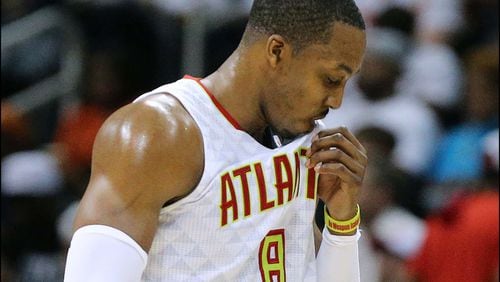I understand there's no bed check for home games. I get that Dwight Howard is 31 years old and should be able to make his own decisions as a man. But out until 2 a.m. before a potential playoff elimination game? Really?
You've probably seen the story by now: Howard, who just completed his first inglorious season with the Hawks, was ticketed for speeding, driving with a suspended registration and no insurance in the early morning hours before what turned out to be the Hawks' season-ending playoff loss to Washington on April 28.
No wonder coach Mike Budenholzer had him on the bench in the fourth quarter. Howard needed a nap.
Recapping:
• Via Mitchell's Northam's story in the AJC: "At 2:06 a.m. that morning an officer saw a blue car speeding on westbound I-285 near Chamblee-Dunwoody Road. The car, traveling at 95 mph in a 65 mph zone ..." Comment: Dangerous, dumb, immature.
• Howard was driving with a suspended tag. A car registration often is suspended when there's no insurance on the vehicle.
• Howard was driving with no insurance. He had his car impounded. Let's assume for argument here that Howard just forgot to pay his bill. At best, that shows extreme laziness.
• Worst of all -- well, or second to the danger of speeding -- Howard was out past 2 a.m. the night before a playoff game. It was before Game 6, which the Hawks needed to win to send the series back to Washington for a seventh game. So much for showing dedication to your profession, your teammates and the organization that signed you. So much for preparing yourself to give the best possible athletic performance.
Howard, who signed with his hometown Hawks for three years and $70.5 million, improved the team's rebounding this season, but overall made the team worse because of his struggles trying to blend into the team's motion and ball-sharing offense. He was benched down the stretch of several games, including the entire fourth quarter of two of the playoff losses to Washington.
He aired some of his grievances the day after the final loss, saying, "It was very difficult. I want to play. I want to be out on the floor. I want to make a difference. I want to make an impact, and I can't do that on the bench."
His frustration was understandable. But being out late the night before the game just makes him look worse.
Some have wondered if the Hawks will trade Howard this offseason. I'm sure they'll try. They've probably already tried. But there's not a huge market for a center with $47 million left on his contract who can do only one thing consistently at this stage of his career (rebound).
It's worth noting: Howard was a free agent last summer, and the Hawks might have been the only team genuinely interested in him (which made their contract offer that much stranger). So if the Hawks do manage to deal him, it will equate to a salary dump because they're not likely to get any real assets back in return.
The Hawks plan to hire a new general manager after the recent demotions of coach Mike Budenholzer (formerly also the president of basketball operations) and Wes Wilcox (who has gone from general manager to "special adviser" to likely gone soon). Howard's future will be one of the first major decisions.
Subscribe to the, “We Never Played The Game” podcast with the AJC's Jeff Schultz and WSB’s Zach Klein on iTunes. Episodes also can be downloaded from on-demand link on WSBRadio.com.
- Atlanta Confidence rankings: Falcons again at top
- Hawks' Ressler made right decision in end but quick GM hire is needed
- Ryan Howard hopes to get call up from Braves soon
- Tony Ressler's apparent U-turn: Hawks' shake-up may be coming
- Swanson handling things fine but Braves need to slow the promotion train
- Odds says Falcons will win NFC South again but record will drop
- Howard upset at benching and this homecoming seemed doomed from start
- Hawks' quick playoff exit affirms change is needed
- If McKinley is as good as he is emotional, Falcons chose well
- Falcons' drafts have become comfortable days since Dan Quinn's arrival
- Draft day blog: Falcons, Quinn still need to be thinking about defense
- Mike Budenholzer has reaffirmed the obvious --he can coach
- Credit to Kirby Smart for making right decision quickly on recruit
- Exclusive: Tony Ressler says he makes final decisions, plans no changes in front office
- Jacon Eason improving but spring game isn't time for deep analysis
- Falcons looks set up for future but payroll likely to become a problem
- Mixon off Falcons' draft board; team still uncertain about Freeney return
- Inciarte finally filling Braves' void left by Andruw Jones
- In Braves and Falcons stadium battle, Blank's tank is stuck at start line
- Hawks are in playoffs and few seem to care -- that's a problem
- When Buzz wears off, Braves will go as far as pitching carries them
- Chipper Jones: Watch for home runs in Braves' new stadium
- Julio Teheran, best the Braves have, struggles but wins on opening night
- Bobby Cox built Braves first time, he was right man to honor with statue
- Wizards' Wall, Beal present problems for Hawks in playoff series
- Sergio Garcia: A great Masters story we didn't see coming
- Jordan Spieth proving he's as resilient as he is good
- About Bubba Watson, his 'joke' and his 'love' for journalists
- Masters mystery: What has happened to Bubba Watson?
- Dustin Johnson and Masters have a day to forget
- Podcast blog: R.E.M.'s Mike Mills on Masters, sports, music and more
About the Author






